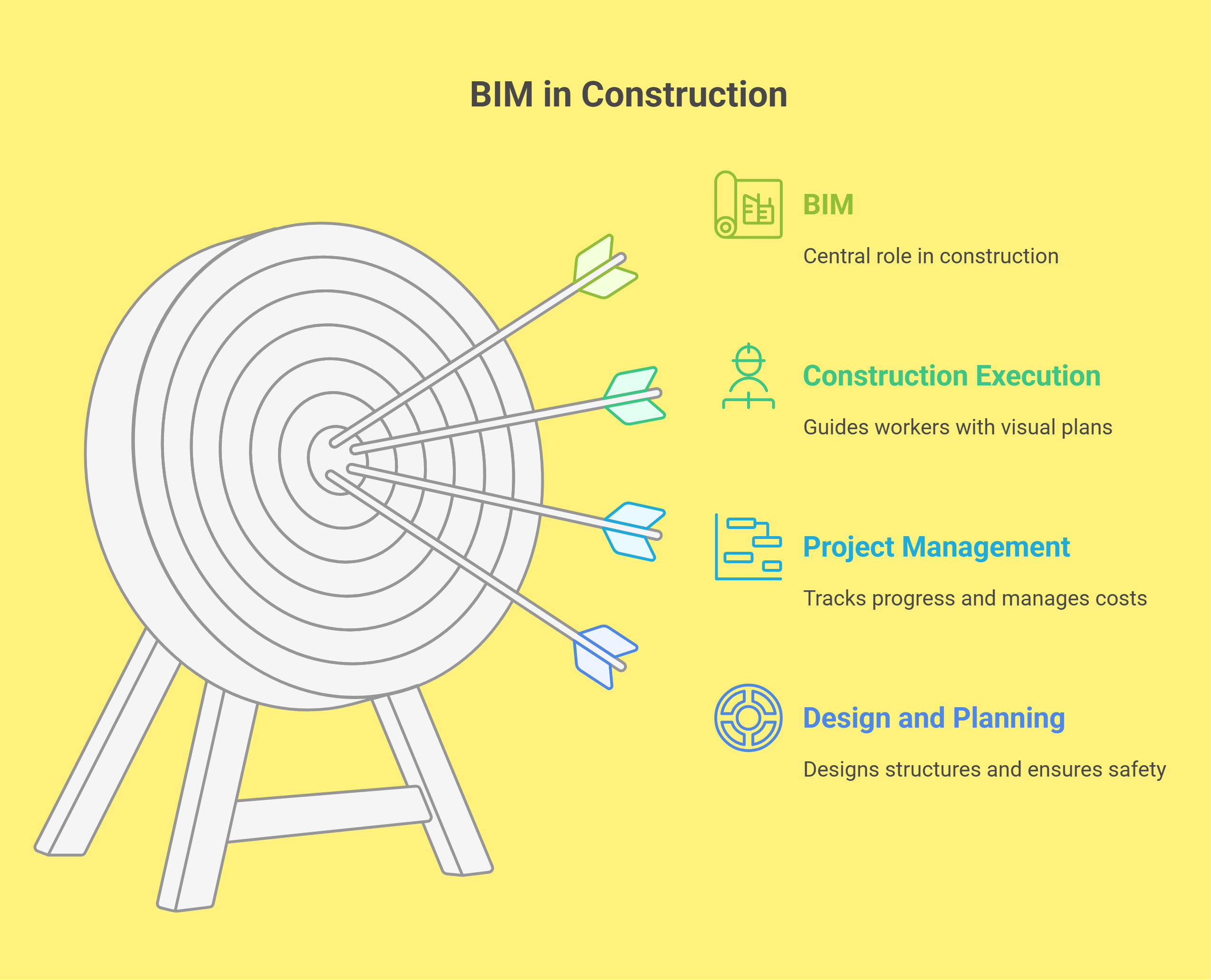Table of Contents
In today’s fast-changing world, technology is reshaping construction. BIM Civil Engineers are now leading this digital shift. They use smart tools to design, plan, and manage better. This saves time, reduces waste, and improves quality. Projects that once took months are now completed faster. Many companies now look for BIM skills first. It’s not just about drawing; it’s about building smarter. The demand for BIM Civil Engineers is growing every day.
This change is happening all over the world. Governments want smarter, greener, and safer infrastructure. From roads to airports, everything needs better planning. BIM helps in making clear and accurate designs. It also helps teams work together easily. As cities grow, the need for such experts grows too. BIM is no longer an option—it’s a must.
Get Career-Oriented BIM Certification Course with Expert Mentors! Get a free demo here!
Why BIM Civil Engineers Are in Huge Demand?: Introduction
The construction world is changing with new technology tools. One of the biggest changes is the use of BIM. BIM stands for Building Information Modeling in short. It helps engineers plan and build projects better. Many companies now prefer BIM-trained civil engineers. BIM Civil Engineers are needed in almost every big project. They help save time, money, and reduce mistakes.
Here’s why BIM Civil Engineers are in huge demand:
1. Better Project Planning
-
BIM gives a clear model of the structure.
-
Engineers can spot and fix errors before building.
2. Time and Cost Savings
-
BIM helps reduce delays in construction work.
-
Material use is planned well, cutting extra costs.
3. Easy Team Collaboration
-
Teams can share updates through one BIM platform.
-
Everyone stays informed with real-time data changes.
4. More Job Opportunities
-
Many industries are hiring BIM-skilled civil engineers.
-
Roles include design, coordination, and project management.
5. Government Project Support
-
Many public projects now ask for BIM use.
-
It ensures better quality and smooth project tracking.
With these benefits, BIM Civil Engineers are in great demand today.
What Is BIM and How It Applies to Civil Engineering?
BIM means Building Information Modeling. It is a smart digital method. BIM creates 3D models with real project data. These models help plan, design, and manage buildings better. Civil engineers use BIM to design roads, bridges, and more. It helps avoid mistakes during planning and building stages. BIM also improves teamwork between all project members. With BIM, civil projects become faster, safer, and more accurate.
What Is BIM?
A. Definition
-
BIM stands for Building Information Modeling.
-
It creates 3D models with detailed design data.
-
The model updates in real-time as changes happen.
B. Key Features
-
Combines design, cost, and schedule in one file.
-
Allows clash detection before construction begins.
-
Helps visualise the entire project in early stage.
How BIM Applies to Civil Engineering
A. Design and Planning
-
BIM helps design structures like bridges and highways.
-
Engineers check design safety before real construction.
-
It improves accuracy in land, water, and road planning.
B. Project Management
-
BIM tracks progress of each construction step.
-
Time and cost are managed using live data.
-
Project teams follow one shared digital model.
C. Construction Execution
-
BIM guides the workers with step-by-step visual plans.
-
Reduces rework caused by unclear or wrong designs.
-
Saves time by giving exact measurements and details.
Common Uses of BIM in Civil Engineering
| Application | How BIM Helps |
|---|---|
| Road Design | Accurate curves, levels, and material use |
| Bridge Construction | Stress testing and structural stability check |
| Railway Projects | Precise track alignment and land use planning |
| Drainage Systems | Flow simulation and layout planning |
| Tunnels | Safe layout and clash-free structure |
Why BIM Matters for Civil Engineers
-
It improves safety and project quality.
-
BIM reduces delays and cost overruns.
-
Helps meet green and smart city goals.
This is how BIM is shaping civil engineering today. Civil engineers who use BIM are building the future smartly.
Master BIM and Elevate Your Career – Enroll Today!
Stay ahead in the construction and design industry with our comprehensive BIM Course! Learn Building Information Modeling (BIM) from experts, gain hands-on experience with top software, and boost your career prospects. Join now and become a certified BIM professional!
Know MoreWhy the Demand for BIM-Civil Engineers Is Booming
Technology is changing how the world builds and designs. BIM is now a must in construction projects. It helps reduce waste, errors, and project delays. Civil engineers using BIM save time and resources. This makes them valuable to modern construction companies. As cities grow, so does the need for BIM experts.
Governments also support BIM for better infrastructure control. Public projects now ask for BIM-based planning systems. Large firms want to work faster, cheaper, and smarter. BIM helps achieve these goals with digital accuracy. Civil engineers with BIM skills are always in demand. Their role is now key in every project phase. BIM-Civil Engineers are becoming the future of construction work.
Reasons Behind the BIM-Civil Engineer Demand Surge
1. Rising Need for Smart Infrastructure
-
Cities need better roads, bridges, and buildings.
-
BIM ensures safe, quick, and cost-friendly designs.
-
Urban projects use BIM for long-term success.
2. Government Support and Mandates
-
Many countries made BIM use mandatory in tenders.
-
Public works now require BIM-based documentation.
-
It improves transparency and design quality.
3. Cost and Time Efficiency
-
BIM finds design errors before building starts.
-
Helps avoid rework and material waste.
-
Timeline and cost plans are more accurate.
4. Industry-Wide Digital Transformation
-
Companies now shift to digital project planning.
-
Paper-based plans are slow and outdated.
-
BIM offers real-time updates and sharing tools.
5. Growing Real Estate and Infrastructure Sector
-
Real estate projects are increasing every year.
-
BIM helps plan residential and commercial layouts.
-
Infrastructure growth boosts BIM engineer hiring needs.
6. Better Team Collaboration and Communication
-
BIM allows everyone to work on one model.
-
Engineers, architects, and clients stay informed.
-
This avoids confusion and boosts project speed.
7. Global Demand for Sustainable Projects
-
BIM checks energy use and environmental impacts.
-
Supports green building standards and smart city goals.
-
Sustainable designs need BIM civil engineers today.
BIM-Civil Engineers are more than just designers now. They are leaders in shaping the built world smarter.
Get Career-Oriented BIM Certification Course with Expert Mentors! Get a free demo here!
Which Industries Are Hiring BIM Civil Engineers?
The demand for BIM Civil Engineers is not limited. Many industries now rely on their skills and tools. BIM helps improve accuracy in both design and planning. That’s why more sectors want BIM-trained engineers today. They help deliver fast, safe, and cost-saving results. As BIM grows, new job opportunities open every day.
From real estate to railways, BIM is everywhere now. Each industry uses BIM for smart and clear planning. Engineers with BIM skills get hired quickly across sectors. Firms need experts who understand both design and data. BIM Civil Engineers now work beyond construction sites too. Their role has grown in scope and importance. Let’s explore the top industries hiring them today.
Top Industries Hiring BIM Civil Engineers
1. Construction and Real Estate
-
Use BIM to plan buildings from start to end.
-
BIM helps in floor layout and space management.
-
Ensures smooth coordination between all design teams.
2. Infrastructure and Transportation
-
BIM designs roads, railways, bridges, and flyovers.
-
Allows stress and safety tests before construction begins.
-
Helps manage traffic flow and land-use data.
3. Urban Planning and Smart Cities
-
City planners use BIM for future-ready designs.
-
It supports zoning, mapping, and public service layouts.
-
Makes cities smarter, cleaner, and more connected.
4. Water and Environmental Engineering
-
BIM maps water pipelines and drainage systems easily.
-
Ensures water flow, treatment, and flood planning.
-
Reduces environmental damage with accurate simulations.
5. Oil, Gas, and Energy Sector
-
Used in planning refineries, pipelines, and power stations.
-
BIM checks system clashes before building starts.
-
Increases safety and energy use efficiency.
6. Consulting and Design Firms
-
Hires BIM experts for design and documentation work.
-
Offers modeling support to civil and architectural teams.
-
Provides client presentations with detailed 3D visuals.
7. Government and Public Sector Projects
-
BIM used in schools, hospitals, and infrastructure plans.
-
Helps monitor public project timelines and budgets.
-
Ensures better reporting and project transparency.
BIM Civil Engineers now fit into almost every industry. Their skills help build a faster and better tomorrow.
Top Skills That Make BIM Civil Engineers Stand Out
BIM Civil Engineers need more than just basic knowledge. They must master both technical and soft skills. These skills help them manage projects smoothly and efficiently. Companies want engineers who can think and build smartly. From 3D modeling to team coordination, every skill matters. Good BIM engineers solve problems before they reach the site. They also communicate clearly with all team members. These skills help them lead and deliver successful projects.
Must-Have Technical Skills
1. BIM Software Expertise
-
Learn tools like Revit, Navisworks, and Civil 3D.
-
These tools help create accurate 3D project models.
-
They also detect clashes before work begins.
2. 3D Modeling and Visualization
-
Create real-world visuals using design inputs.
-
Models show how projects look before building starts.
-
Helps teams and clients understand designs better.
3. Clash Detection and Resolution
-
Find issues between different building systems early.
-
Avoid delays due to design mismatches on-site.
-
Ensure smooth flow during construction phases.
4. Project Data Management
-
Store design data in one shared BIM file.
-
Track changes in cost, time, and materials.
-
Reduce confusion with updated digital records.
Must-Have Soft Skills
1. Team Collaboration
-
Work well with architects, engineers, and managers.
-
Share updates using the BIM model.
-
Help keep everyone aligned with project goals.
2. Communication Skills
-
Explain technical ideas in simple words.
-
Present reports to clients and teams clearly.
-
Handle meetings and design reviews with ease.
3. Problem-Solving
-
Fix design issues quickly with smart decisions.
-
Reduce downtime by planning better solutions.
-
Stay calm during project challenges and risks.
4. Time Management
-
Meet deadlines by following BIM-based timelines.
-
Organize tasks using BIM scheduling tools.
-
Deliver each project stage on time.
Key Skills Summary Table
| Skill Area | Examples / Tools |
|---|---|
| BIM Software | Revit, Civil 3D, Navisworks |
| 3D Modeling | InfraWorks, AutoCAD, Tekla |
| Clash Detection | Navisworks Manage, Solibri |
| Data Handling | BIM 360, Common Data Environment (CDE) |
| Team Collaboration | Shared models, real-time file updates |
| Communication | Reports, presentations, meetings |
| Time Management | BIM-based scheduling tools |
These skills make BIM Civil Engineers valuable and job-ready. The more skills they master, the stronger their career grows.
Master BIM and Elevate Your Career – Enroll Today!
Stay ahead in the construction and design industry with our comprehensive BIM Course! Learn Building Information Modeling (BIM) from experts, gain hands-on experience with top software, and boost your career prospects. Join now and become a certified BIM professional!
Know MoreSalary & Career Outlook
The future looks bright for BIM Civil Engineers today. Many industries need them for smart and safe projects. Their work adds value from planning to project delivery. As demand grows, salaries and job roles increase too. Skilled engineers can work in India or abroad easily. With the right tools, they can lead major projects. Let’s look at their salary range and career scope.
Salary Structure in India
1. Entry-Level (0–2 years)
-
Salary: ₹3 LPA to ₹5 LPA
-
Job roles: Junior BIM Engineer, Site BIM Support
-
Skills: Basic software use, 3D modeling, coordination
2. Mid-Level (2–5 years)
-
Salary: ₹6 LPA to ₹10 LPA
-
Job roles: BIM Coordinator, Infrastructure Modeler
-
Skills: Clash detection, planning, team handling
3. Senior-Level (5+ years)
-
Salary: ₹12 LPA and above
-
Job roles: BIM Manager, Project Lead
-
Skills: Project control, team leadership, client handling
Salary Structure Abroad (Average Annual)
| Country | Entry-Level | Mid-Level | Senior-Level |
|---|---|---|---|
| USA | $55,000 | $75,000 | $100,000+ |
| UK | £30,000 | £45,000 | £65,000+ |
| UAE | AED 90,000 | AED 140,000 | AED 200,000+ |
| Australia | AUD 60,000 | AUD 90,000 | AUD 130,000+ |
Career Growth Options
1. Specialization Paths
-
Move into BIM for railways, airports, or bridges
-
Learn advanced software tools and coordination methods
2. Project Leadership Roles
-
Lead full-scale projects as BIM Project Manager
-
Oversee planning, execution, and team workflows
3. Global Career Opportunities
-
BIM jobs available in Europe, Middle East, and Asia
-
Many companies offer visa support and relocation help
BIM Civil Engineers have stable and growing careers ahead. Their skills open doors to top roles and higher pay.
Conclusion
BIM is changing how civil engineers plan and build. It makes work faster, smarter, and more cost-effective. BIM Civil Engineers are now in high global demand. Their skills help reduce errors and improve project quality. Many industries now depend on BIM-trained civil engineers. With BIM, teams work better and share updates easily. The future of construction belongs to BIM experts. Now is the best time to learn BIM skills.
Key Takeaways
-
BIM means Building Information Modeling
-
BIM helps in 3D planning and project coordination
-
BIM Civil Engineers are needed in many industries
-
They reduce costs, delays, and design mistakes
-
Top hiring sectors include real estate and infrastructure
-
Skills like Revit, Civil 3D, and teamwork matter
-
Career growth is fast in India and abroad
-
BIM offers high salaries and strong job security
Master BIM and Elevate Your Career – Enroll Today!
Stay ahead in the construction and design industry with our comprehensive BIM Course! Learn Building Information Modeling (BIM) from experts, gain hands-on experience with top software, and boost your career prospects. Join now and become a certified BIM professional!
Know MoreFrequently Asked Questions
What does a BIM Civil Engineer actually do?
A BIM Civil Engineer uses digital tools to design and manage civil projects. They create 3D models, detect design clashes, and coordinate with teams to ensure smooth project execution from start to finish.
Is BIM only useful for buildings and architecture?
No. BIM is used in civil infrastructure like roads, bridges, tunnels, water systems, and urban planning. It supports every stage of a civil engineering project.
Do I need a civil engineering degree to work in BIM?
Yes. Most BIM roles require a degree in civil engineering or a related field. Additional training in BIM tools and software is essential to become job-ready.
Which software should a BIM Civil Engineer learn first?
Start with Autodesk Revit and Civil 3D. Later, you can add Navisworks, InfraWorks, and BIM 360 for advanced projects and coordination.
Are BIM jobs available in both India and abroad?
Yes. BIM engineers are in demand in India, UAE, UK, USA, Australia, and more. Many global firms prefer candidates with BIM certification and project experience.
How is BIM different from AutoCAD?
AutoCAD is mainly for 2D drafting. BIM goes beyond by creating intelligent 3D models with data, supporting better planning, clash detection, and project simulation.
What are the career options for BIM Civil Engineers?
You can become a BIM Engineer, BIM Coordinator, BIM Manager, Infrastructure Modeler, or Design Consultant. With experience, you can lead large projects.
What are the main benefits of using BIM in civil projects?
BIM improves accuracy, reduces project errors, cuts costs, and saves time. It also ensures better teamwork and faster decision-making on-site.
Is BIM required in government projects?
Yes. Many countries, including India, now mandate BIM for public infrastructure projects. BIM helps ensure quality, accountability, and timely completion.
How can I start a career as a BIM Civil Engineer?
Get a civil engineering degree, learn BIM software, and take a certified BIM course. Gain hands-on experience with small projects before applying for jobs.













